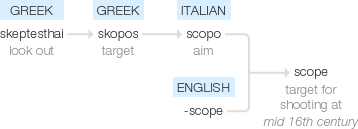Scope
mid 16th century (in the sense ‘target for shooting at’): from Italian scopo ‘aim’, from Greek skopos ‘target’, from skeptesthai ‘look out’. scope (sense 3 of the noun) is derived from -scope.
wiktionary
From Italian scopo(“purpose”), from Latin scopus(“target”) [1] [2], from Ancient Greek σκοπός(skopós), from σκέπτομαι(sképtomai), from Proto-Indo-European *speḱ-. Etymologically related to skeptic and spectrum.
Latin scopa
etymonline
scope (n.1)
"extent," 1530s, "room to act," from Italian scopo "aim, purpose, object, thing aimed at, mark, target," from Latin scopus, from Greek skopos "aim, target, object of attention; watcher, one who watches" from metathesized form of PIE *spek-yo-, suffixed form of root *spek- "to observe." Sense of "distance the mind can reach, extent of view" first recorded c. 1600.
scope (n.2)
"instrument for viewing," 1872, abstracted from telescope, microscope, etc., from Greek skopein "to look" (from PIE root *spek- "to observe"). Earlier used as a shortening of horoscope (c. 1600).
scope (v.)
"to view," 1807, from the source of scope (n.2). Related: Scoped; scoping.
